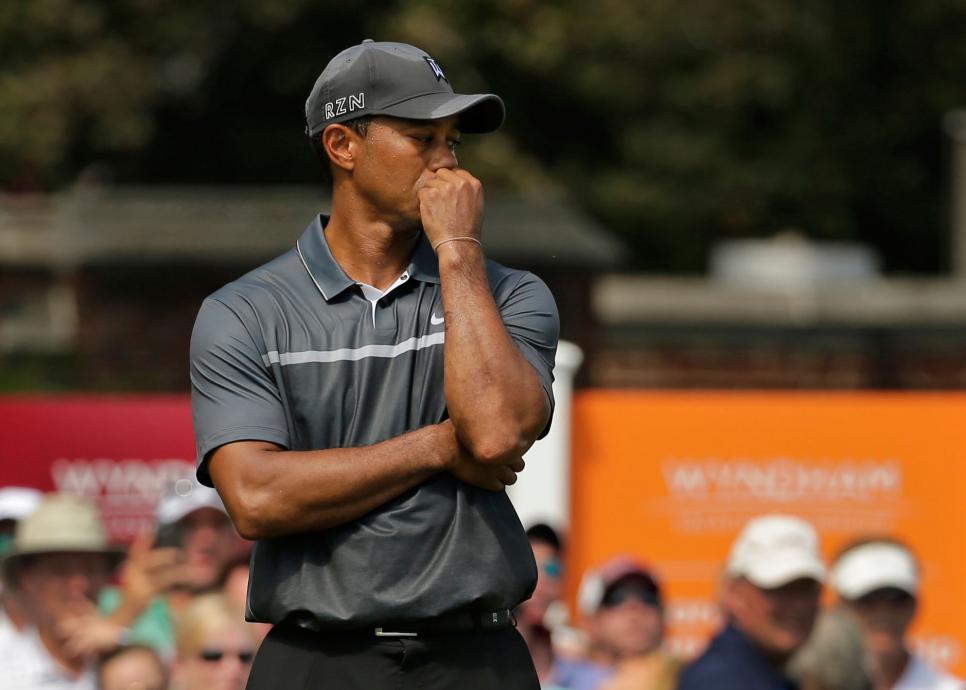News
When is it OK for a healthy player to withdraw from a tournament? It depends

Photo by Dom Furore
Is thinking you’re going to play bad an acceptable reason for withdrawing from an athletic competition? Though Tiger Woods has ceased to be a role model in life, he’s still very much one in sport, and so the likely future Ryder Cup captain’s turnabout at the Safeway Open three days after signing up warrants this specific ethical scrutiny.
If your son or daughter (or member-guest partner) decided on the eve of an event that he or she just weren’t feeling up to it—physically fine but generally pessimistic about the state of his or her skills—there’s little question what your response would be: Just go out and give it your best and see what happens. Meeting circumstances with which you don’t feel entirely comfortable, as well as honoring commitments, is the stuff of life. The point of competing is not in the outcome, but in the trying. Harden up. Or something along those lines.
"With all my clients, I always stress quality over quantity," Dr. Bob Rotella says. "It’s not about how many tournaments you play. It’s about how many you play when you feel ready in every capacity."
But maybe professionals are exempt from this common standard precisely because livelihoods are involved. If Tiger Woods suspects he is incapable of “competing against the best players in the world,” it would be wrong of him to deny this opportunity to another professional (in this case, first-alternate Max Homa, whose career could be very much impacted by one hot week). Nevermind Tiger’s supposed obligation to his sponsors to compete when healthy. For the moment, disregard the posters bearing his image used to promote the event. Forget the thousands of disappointed ticketholders whose purchase-decision and travel plans were made primarily (solely?) in hope of seeing Big Cat return. On a purely sporting level, is it OK to cancel?

A familiar trope in golf is that the connection between how well you hit it on the range and how you score on the course is maddeningly tenuous. Great warm-ups lead to awful rounds and vice-versa. Therefore, given the random nature of golf, it’s always in your self-interest to try. More than other athletes, golfers never know when they’re going to have their day, so it behooves them to make sure they’re actually playing the day the planets are aligned to allow all their 30-footers to drop.
However, it stands to reason that professionals are more in-tune with their skills and thus more apt at forecasting their performance. That pro streaks tend to last longer also makes for easier predicting. We remember great players for their three- and four-year stretches of winning golf (Tiger’s decade of dominance being preternatural) while lesser pros typically enjoy three or four good months. The scratch player at your club often seems to find his game for three or four weeks, while the hacker is usually hoping to find it for three or four holes in a row. Or shots. So whereas you or I might magically find the thing that rights our short game mid-round, Tiger appreciates the scope of his temporary inadequacy on a deeper technical level. He doesn’t need to see the dice tumble.
But even if we allow the difference between guessing you’re going to play bad and knowing it, does that make a withdrawal more excusable?
Renowned sports psychologist Dr. Bob Rotella thinks yes. “Why would you play? You’re going to beat yourself up, and let others get used to beating you," Rotella said this week. "With all my clients, I always stress quality over quantity. It’s not about how many tournaments you play. It’s about how many you play when you feel ready in every capacity.”
Rotella allows that most amateurs need more experience playing tournament golf and so should think hard about turning down those rounds when work, family and other forces conspire to limit them. What’s critical, he says, “is to identify if you’re withdrawing because you care too much about what other people think about what you shoot. You can’t compete to impress people. Only compete because you love the challenge.”
From the beginning of his career, Tiger Woods defined success narrowly—winning. Whether he withdrew from the Safeway Open because he coolly recognized this impossibility, or because he feared the prying public attention that would accompany carding 80-80, is a matter of conjecture. What’s certain is that the oldest 40-year-old in golf doesn’t need the experience of competing to learn about competing.
Because I’ve never won anything of significance that would get me exempt, the bulk of my competitive golf consists of qualifiers to get into elite amateur events. Whether for the U.S. Mid-Amateur or Met Amateur, these things are usually something like 100 players for two or three spots, and so for every contestant anything less than his absolute best will not advance. The good folks running these Monday or Tuesday events can reliably count on about 10 percent of the field withdrawing, and so are experts at repairing groups on the fly.
The night before for a U.S. Amateur Public Links sectional qualifier in 2010, I left a voicemail with the Country Club of Woodbridge (Conn.) pro shop stating my name and intent to withdraw. The last round I’d played was dreadful, I didn’t think it was worth missing a day of work, and I was motivated by the idea I might retrieve some or even all of my $125 entry fee. I was too green to know that I had to contact the state golf association, not the guy picking the range at 7 p.m.
My colleague, Mike Stachura, senior editor of equipment, overheard my leaving of the message, leaned over our dividing cubicle wall, and called me a ________. I replied that I wasn’t the least bit concerned with posting high scores; I’d done that so many times as to be inured to embarrassment.
“You have an opportunity tomorrow to compete at a level most golfers never will, and you’re throwing that away why?” Stachura said.
Censured and un-refunded, I played. I shot a reasonable 75 (+4) in the morning, and then 65 in the afternoon to qualify. (While this must sound like very dated bragging, trust me when I say this was the greatest aberration of my golfing life. At that time I had never broken 70 in a real tournament and have only done so a handful of times since. All that transpired that afternoon was insane.) Next in the chain of events was being paired for two days alongside Patrick Reed at the tournament proper in Greensboro, N.C. When people ask who’s the best player I’ve ever played with, I have an answer.
So, is thinking you’re going to play bad an acceptable reason for withdrawing from an athletic competition? In an individual sport, the only person you must answer is yourself. I’ve used the story of my PubLinx qualifier as a guiding principle since: If you can bear to imagine the possibility that you’re denying yourself a special experience, the parallel universe of events, then yes. In the case of Tiger Woods, he could probably live with the fact he didn’t win the 2016 Safeway Open.